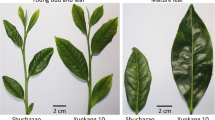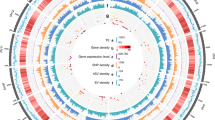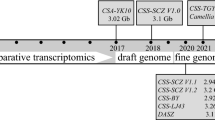Abstract
The tea plants have been one of the most widely consumed and oldest nonalcoholic beverage crops in the world. Lingyun Baihao tea plants are unique species and widely distribute in Guangxi. It is well known that aroma usually determine the quality of tea. In recent years, molecular identification has been employed in the tea plant at the genetic level. However, the association of aroma loss issues to genetic diversities between wild and cultivated tea plants is not clear. Here, we identified 112,938,224 single nucleotide polymorphisms (SNPs) and 10,736,211 insertions/deletions (InDels) for the tea plants through the whole genome sequencing technology. Both SNPs and InDels have certain characteristics in the tea genome, which transition in SNPs type distributes wildly comparing with transversion and single base variation has absolute advantage in InDels. These markers demonstrated that DNA polymorphisms and high diversity. Collectively, we confirmed that the loss of aroma might due to genetic differences at the molecular level between wild and cultivated tea plants, which will be valuable resources for further genetic researches of Lingyun Baihao tea plant.



Similar content being viewed by others
References
An Y, Mi X, Zhao S, Guo R, Xia X, Liu S et al (2020) Revealing distinctions in genetic diversity and adaptive evolution between two varieties of Camellia sinensis by whole-genome resequencing. Front Plant Sci 24(11):603819. https://doi.org/10.3389/fpls.2020.603819
Azizi P, Hanafi MM, Sahebi M, Harikrishna JA, Taheri S, Yassoralipour A et al (2020) Epigenetic changes and their relationship to somaclonal variation: a need to monitor the micropropagation of plantation crops. Funct Plant Biol 47(6):508–523. https://doi.org/10.1071/FP19077
Bai H, Cao Y, Quan J, Dong L, Li Z, Zhu Y et al (2013) Identifying the genome-wide sequence variations and developing new molecular markers for genetics research by re-sequencing a Landrace cultivar of foxtail millet. PLoS ONE 8(9):e73514. https://doi.org/10.1371/journal.pone.0073514
Belaj A, de la Rosa R, Lorite IJ, Mariotti R, Cultrera NGM, Beuzón CR et al (2018) Usefulness of a new large set of high throughput EST-SNP markers as a tool for olive germplasm collection Management. Front Plant Sci 21(9):1320. https://doi.org/10.3389/fpls.2018.01320
Chen L, Gao QK, Chen DM et al (2005) The use of RAPD markers for detecting genetic diversity, relationship and molecular identification of Chinese elite tea genetic resources [Camellia sinensis (L.) O. Kuntze]. Biodivers Conserv 14(6):1433–1444. https://doi.org/10.1007/s10531-004-9787-y
Chen L, Zhou ZX, Yang YJ (2006) Genetic improvement and breeding of tea plant (Camellia sinensis) in China: from individual selection to hybridization and molecular breeding. Euphytica 154(1–2):239–248. https://doi.org/10.1007/s10681-006-9292-3
Chen K, Wang Y, Zhang R, Zhang H, Gao C (2019) CRISPR/Cas genome editing and precision plant breeding in agriculture. Annu Rev Plant Biol 29(70):667–697. https://doi.org/10.1146/annurev-arplant-050718-100049
DePristo MA, Banks E, Poplin R, Garimella KV et al (2011) A framework for variation discovery and genotyping using next-generation DNA sequencing data. Nat Genet 43:491–498
Fang K, Xia Z, Li H, Jiang X, Qin D, Wang Q et al (2021) Genome-wide association analysis identified molecular markers associated with important tea flavor-related metabolites. Hortic Res 8(1):42. https://doi.org/10.1038/s41438-021-00477-3
Feng Z, Li Y, Li M, Wang Y, Zhang L, Wan X et al (2019) Tea aroma formation from six model manufacturing processes. Food Chem 1(285):347–354. https://doi.org/10.1016/j.foodchem.2019.01.174
Hu Y, Mao B, Peng Y, Sun Y, Pan Y, Xia Y et al (2014) Deep re-sequencing of a widely used maintainer line of hybrid rice for discovery of DNA polymorphisms and evaluation of genetic diversity. Mol Genet Genom 289(3):303–315. https://doi.org/10.1007/s00438-013-0807-z
Jander G, Norris SR, Rounsley SD, Bush DF, Levin IM, Last RL (2002) Arabidopsis map-based cloning in the post-genome era. Plant Physiol 129(2):440–450. https://doi.org/10.1104/pp.003533
Jeyaraj A, Wang X, Wang S, Liu S, Zhang R, Wu A et al (2019) Identification of regulatory networks of MicroRNAs and their targets in response to Colletotrichum gloeosporioides in tea plant (Camellia sinensis L.). Front Plant Sci 10:1096. https://doi.org/10.3389/fpls.2019.01096
Jiang CK, Ma JQ, Liu YF, Chen JD, Ni DJ, Chen L (2020) Identification and distribution of a single nucleotide polymorphism responsible for the catechin content in tea plants. Hortic Res 1(7):24. https://doi.org/10.1038/s41438-020-0247-y
Jin J-Q, Yao M-Z, Ma C-L, Ma J-Q, Chen L (2016) Association mapping of caffeine content with TCS1 in tea plant and its related species. Plant Physiol Biochem 105:251–259. https://doi.org/10.1016/j.plaphy.2016.04.032
Labate JA, Baldo AM (2005) Tomato SNP discovery by EST mining and resequencing. Mol Breed 16(4):343–349. https://doi.org/10.1007/s11032-005-1911-5
Li H, Handsaker B, Wysoker A, Fennell T, Ruan J, Homer N et al (2009) The sequence alignment/map format and SAMtools. Bioinform 25(16):2078–2079
Li H, Durbin R (2009) Fast and accurate short read alignment with Burrows-Wheeler transform. Bioinform 25(14):1754–1760. https://doi.org/10.1093/bioinformatics/btp324
Li CF, Zhu Y, Yu Y, Zhao QY, Wang SJ, Wang XC et al (2015) Global transcriptome and gene regulation network for secondary metabolite biosynthesis of tea plant (Camellia sinensis). BMC Genom 16(1):560. https://doi.org/10.1186/s12864-015-1773-0
Li FD, He F, Ye XJ, Shen W, Wu YP, Zhai YJ et al (2016) Tea consumption is inversely associated with depressive symptoms in the elderly: a cross-sectional study in eastern China. J Affect Disord 15(199):157–162. https://doi.org/10.1016/j.jad.2016.04.005
Li W, Xiang F, Zhong M, Zhou L, Liu H, Li S et al (2017) Transcriptome and metabolite analysis identifies nitrogen utilization genes in tea plant (Camellia sinensis). Sci Rep 7(1):1693. https://doi.org/10.1038/s41598-017-01949-0.PMID:28490757;PMCID:PMC5431998
Liu S, An Y, Tong W, Qin X, Samarina L, Guo R et al (2019) Characterization of genome-wide genetic variations between two varieties of tea plant (Camellia sinensis) and development of InDel markers for genetic research. BMC Genom 20(1):935. https://doi.org/10.1186/s12864-019-6347-0
Maritim TK, Seth R, Parmar R, Sharma RK (2021) Multiple-genotypes transcriptional analysis revealed candidates genes and nucleotide variants for improvement of quality characteristics in tea (Camellia sinensis (L.) O. Kuntze). Genomics 113(1 Pt 1):305–316. https://doi.org/10.1016/j.ygeno.2020.12.020
Mukhopadhyay M, Mondal TK, Chand PK (2016) Biotechnological advances in tea (Camellia sinensis [L.] O. Kuntze): a review. Plant Cell Rep 35(2):255–87. https://doi.org/10.1007/s00299-015-1884-8
Niu S, Song Q, Koiwa H, Qiao D, Zhao D, Chen Z et al (2019) Genetic diversity, linkage disequilibrium, and population structure analysis of the tea plant (Camellia sinensis) from an origin center, Guizhou plateau, using genome-wide SNPs developed by genotyping-by-sequencing. BMC Plant Biol 19(1):328. https://doi.org/10.1186/s12870-019-1917-5
Pabinger S, Dander A, Fischer M, Snajder R, Sperk M, Efremova M et al (2013) A survey of tools for variant analysis of next-generation genome sequencing data. Brief Bioinform 15(2):256–278
Qiao D, Tang M, Jin L, Mi X, Chen H, Zhu J et al (2022) A monoterpene synthase gene cluster of tea plant (Camellia sinensis) potentially involved in constitutive and herbivore-induced terpene formation. Plant Physiol Biochem 1(184):1–13. https://doi.org/10.1016/j.plaphy.2022.05.016
Ramakrishna G, Kaur P, Nigam D, Chaduvula PK, Yadav S, Talukdar A et al (2018) Genome-wide identification and characterization of InDels and SNPs in Glycine max and Glycine soja for contrasting seed permeability traits. BMC Plant Biol 18(1):141. https://doi.org/10.1186/s12870-018-1341-2
Sarkar D, Kundu A, Das D, Chakraborty A, Mandal NA, Satya P et al (2019) Resolving population structure and genetic differentiation associated with RAD-SNP loci under selection in tossa jute (Corchorus olitorius L.). Mol Genet Genom 294(2):479–492. https://doi.org/10.1007/s00438-018-1526-2
Shi CY, Yang H, Wei CL, Yu O, Zhang ZZ, Jiang CJ et al (2011) Deep sequencing of the Camellia sinensis transcriptome revealed candidate genes for major metabolic pathways of tea-specific compounds. BMC Genom 28(12):131. https://doi.org/10.1186/1471-2164-12-131
Ujihara T, Taniguchi F, Tanaka J, Hayashi N (2011) Development of expressed sequence tag (EST)-based cleaved amplified polymorphic sequence (CAPS) markers of tea plant and their application to cultivar identification. J Agric Food Chem 59(5):1557–1564. https://doi.org/10.1021/jf103311k
Wakeley J (1996) The excess of transitions among nucleotide substitutions: new methods of estimating transition bias underscore its significance. Trends Ecol Evolut 11(4):158–62. https://doi.org/10.1016/0169-5347(96)10009-4
Wang B, Lin Z, Li X, Zhao Y, Zhao B, Wu G et al (2020a) Genome-wide selection and genetic improvement during modern maize breeding. Nat Genet 52(6):565–571. https://doi.org/10.1038/s41588-020-0616-3
Wang X, Feng H, Chang Y, Ma C, Wang L, Hao X et al (2020b) Population sequencing enhances understanding of tea plant evolution. Nat Commun 11(1):4447. https://doi.org/10.1038/s41467-020-18228-8
Wang P, Yu J, Jin S, Chen S, Yue C, Wang W et al (2021) Genetic basis of high aroma and stress tolerance in the oolong tea cultivar genome. Hortic Res 8(1):107. https://doi.org/10.1038/s41438-021-00542-x
Wei C, Yang H, Wang S, Zhao J, Liu C, Gao L et al (2018) Draft genome sequence of Camellia sinensis var. sinensis provides insights into the evolution of the tea genome and tea quality. Proc Natl Acad Sci U. S. A. 115(18):E4151–E4158. https://doi.org/10.1073/pnas.1719622115
Xia EH, Zhang HB, Sheng J, Li K, Zhang QJ, Kim C et al (2017) The tea tree genome provides insights into tea flavor and independent evolution of caffeine biosynthesis. Mol Plant 10(6):866–877. https://doi.org/10.1016/j.molp.2017.04.002
Xia EH, Li FD, Tong W, Li PH, Wu Q, Zhao HJ et al (2019) Tea plant information archive: a comprehensive genomics and bioinformatics platform for tea plant. Plant Biotechnol J 17(10):1938–1953. https://doi.org/10.1111/pbi.13111
Xia EH, Tong W, Wu Q, Wei S, Zhao J, Zhang ZZ, Wei CL, Wan XC (2020a) Tea plant genomics: achievements, challenges and perspectives. Hortic Res 1(7):7. https://doi.org/10.1038/s41438-019-0225-4
Xia E, Tong W, Hou Y, An Y, Chen L, Wu Q et al (2020b) The reference genome of tea plant and resequencing of 81 diverse accessions provide insights into its genome evolution and adaptation. Mol Plant 13(7):1013–1026. https://doi.org/10.1016/j.molp.2020.04.010
Xu LY, Wang LY, Wei K, Tan LQ, Su JJ, Cheng H (2018) High-density SNP linkage map construction and QTL mapping for flavonoid-related traits in a tea plant (Camellia sinensis) using 2b-RAD sequencing. BMC Genom 19(1):955. https://doi.org/10.1186/s12864-018-5291-8
Xu YX, Shen SY, Chen W, Chen L (2019) Analysis of genetic diversity and development of a SCAR marker for green tea (Camellia sinensis) cultivars in Zhejiang Province: the most famous green tea-producing area in China. Biochem Genet 57(4):555–570. https://doi.org/10.1007/s10528-019-09909-1
Yamashita H, Katai H, Kawaguchi L, Nagano AJ, Nakamura Y, Morita A et al (2019) Analyses of single nucleotide polymorphisms identified by ddRAD-seq reveal genetic structure of tea germplasm and Japanese landraces for tea breeding. PLoS ONE 14(8):e0220981. https://doi.org/10.1371/journal.pone.0220981
Yamashita H, Uchida T, Tanaka Y, Katai H, Nagano AJ, Morita A et al (2020) Genomic predictions and genome-wide association studies based on RAD-seq of quality-related metabolites for the genomics-assisted breeding of tea plants. Sci Rep 10(1):17480. https://doi.org/10.1038/s41598-020-74623-7
Yang CS, Wang X, Lu G, Picinich SC (2009) Cancer prevention by tea: animal studies, molecular mechanisms and human relevance. Nat Rev Cancer 9(6):429–439. https://doi.org/10.1038/nrc2641
Yang H, Wei CL, Liu HW, Wu JL, Li ZG, Zhang L et al (2016) Genetic divergence between Camellia sinensis and Its wild relatives revealed via genome-wide SNPs from RAD sequencing. PLoS ONE 11(3):e0151424. https://doi.org/10.1371/journal.pone.0151424
Yu Z, Yang Z (2020) Understanding different regulatory mechanisms of proteinaceous and non-proteinaceous amino acid formation in tea (Camellia sinensis) provides new insights into the safe and effective alteration of tea flavor and function. Crit Rev Food Sci Nutr 60(5):844–858. https://doi.org/10.1080/10408398.2018.1552245
Yu X, Xiao J, Chen S, Yu Y, Ma J, Lin Y et al (2020) Metabolite signatures of diverse Camellia sinensis tea populations. Nat Commun 11(1):5586. https://doi.org/10.1038/s41467-020-19441-1.Erratum.In:NatCommun.2021Mar17;12(1):1829
Zeng L, Watanabe N, Yang Z (2019) Understanding the biosyntheses and stress response mechanisms of aroma compounds in tea (Camellia sinensis) to safely and effectively improve tea aroma. Crit Rev Food Sci Nutr 59(14):2321–2334. https://doi.org/10.1080/10408398.2018.1506907
Zhang CC, Wang LY, Wei K, Cheng H (2014) Development and characterization of single nucleotide polymorphism markers in Camellia sinensis (Theaceae). Genet Mol Res 13(3):5822–5831. https://doi.org/10.4238/2014.April.14.10
Zhang T, Gu M, Liu Y, Lv Y, Zhou L, Lu H et al (2017) Development of novel InDel markers and genetic diversity in Chenopodium quinoa through whole-genome re-sequencing. BMC Genom 18(1):685. https://doi.org/10.1186/s12864-017-4093-8
Zhang QJ, Li W, Li K, Nan H, Shi C, Zhang Y et al (2020a) The chromosome-level reference genome of tea tree unveils recent bursts of non-autonomous LTR retrotransposons in driving genome size evolution. Mol Plant 13(7):935–938. https://doi.org/10.1016/j.molp.2020.04.009
Zhang W, Zhang Y, Qiu H, Guo Y, Wan H, Zhang X, Scossa F, Alseekh S, Zhang Q, Wang P, Xu L, Schmidt MH, Jia X, Li D, Zhu A, Guo F, Chen W, Ni D, Usadel B, Fernie AR, Wen W (2020b) Genome assembly of wild tea tree DASZ reveals pedigree and selection history of tea varieties. Nat Commun 11(1):3719. https://doi.org/10.1038/s41467-020-17498-6.PMID:32709943;PMCID:PMC73816
Zhang W, Luo C, Scossa F, Zhang Q, Usadel B, Fernie AR et al (2021) A phased genome based on single sperm sequencing reveals crossover pattern and complex relatedness in tea plants. Plant J 105(1):197–208. https://doi.org/10.1111/tpj.15051
Zhao DW, Yang JB, Yang SX, Kato K, Luo JP (2014) Genetic diversity and domestication origin of tea plant Camellia taliensis (Theaceae) as revealed by microsatellite markers. BMC Plant Biol 9(14):14. https://doi.org/10.1186/1471-2229-14-14
Zheng Y, Wang P, Chen X, Sun Y, Yue C, Ye N (2019) Transcriptome and metabolite profiling reveal novel insights into volatile heterosis in the tea plant (Camellia sinensis). Molecules 24(18):3380. https://doi.org/10.3390/molecules24183380
Acknowledgements
The authors thank Professor Guorong Chen, Bagui Scholarof Guangxi Zhuang Autonomous Region to LQ.Z. team, Tea Administrative Center of Lingyun County, Lingyun Cenwanglaoshan Baihao tea professional cooperatives and Lingyun Xinyu Ecological Agriculture Co., Ltd for help during data collection.
Funding
This study was financially supported by the Science and Technology Project of Guangxi (2020ZYZX3027, AB2107601), and This work was funded by Bagui Scholar Program Fund (2016A25) of Guangxi Zhuang Autonomous Region to LQ.Z.
Author information
Authors and Affiliations
Contributions
LZ and JM designed the experiments. XW and HS performed most of the experiments and wrote the manuscript. YM and JY performed the field and laboratory work analyzed the data.
Corresponding author
Additional information
Publisher's Note
Springer Nature remains neutral with regard to jurisdictional claims in published maps and institutional affiliations.
Rights and permissions
Springer Nature or its licensor (e.g. a society or other partner) holds exclusive rights to this article under a publishing agreement with the author(s) or other rightsholder(s); author self-archiving of the accepted manuscript version of this article is solely governed by the terms of such publishing agreement and applicable law.
About this article
Cite this article
He, S., Wang, X., Yin, M. et al. Molecular identification of Lingyun Baihao wild and cultivated tea through genome-wide sequencing. Genet Resour Crop Evol 70, 1407–1417 (2023). https://doi.org/10.1007/s10722-022-01510-7
Received:
Accepted:
Published:
Issue Date:
DOI: https://doi.org/10.1007/s10722-022-01510-7




